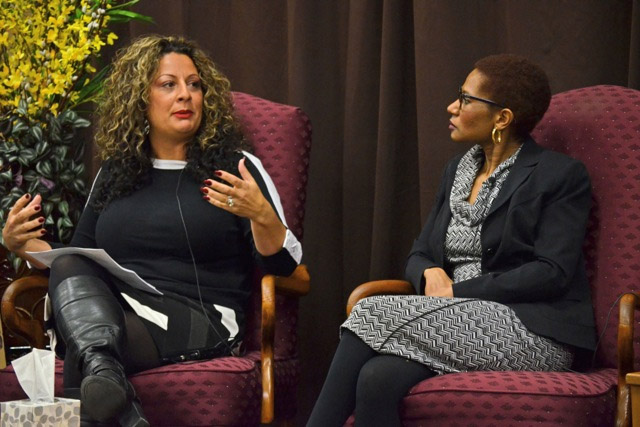By Lian Bunny
News Editor
My child’s father got paid paternity leave. I did not, and I had the baby.”
Eboni Hayes’ statement exemplified the inequality discussed at the second annual women’s panel on Tuesday.
St. Bonaventure’s Russell J. Jandoli School of Journalism and Mass Communication hosted the discussion on women’s issues in the workplace.
Lori Quigley, ’81, dean of the Esteves School of Education at The Sage Colleges; Kimberly DeSimone, ’01, a St. Bonaventure professor of journalism and mass communication; and Hayes, ’98, ’06, a licensed real estate agent, formed the panel. Patrick Vecchio, ’09, a St. Bonaventure professor of journalism and mass communication, moderated the discussion.
Pauline Hoffmann, the journalism and mass communication school dean, said the panel opened the discussion on the importance of equal rights.
“I think it’s important that we recognize the accomplishments of women, mindful of the fact that the fight isn’t over,” Hoffmann said. “A lot of folks think [women] have women’s rights and women can vote, but there’s still not equality. I think it’s important that we see that women can do exactly what men do essentially.”
Hoffmann said this was the second year Bonaventure held a women’s panel and she hopes to develop the idea for the future. She said the event might evolve to become a series of events that happens once a week for the entire month of March or a series that runs every day for a week in March.
The panel, which was held in honor of women’s history month, aimed to define women’s issues in the workplace and explain how these issues affect the professional lives of women, how they affect companies and what needs to be done to make progress.
Quigley said she sees a lack of respect for female intellect in academic circles. Oftentimes women’s research is not as highly regarded as their male counterparts, according to Quigley.
DeSimone agreed and said the work environment is more conducive to men’s success over women’s. Females in business are not paid as well, do not get as many important projects and do not receive the same kind of promotions, according to DeSimone. Approximately 50 percent of Corporate America is female; however, this percentage drops to about 3 percent in upper management positions, DeSimone said.
Hayes said she didn’t like how her company treated her when she had her baby.
“I’ve given [the company] overtime, filled vacancies, everything you’ve asked and beyond, but you can’t help me with this?” Hayes said. “I left.”
DeSimone said she finds it ridiculous that men are expected to have families and jobs, while women are criticized for choosing to have a family when they are in the professional world. She cited a study done recently where a company moved from a 12-week to 16-week maternity policy. The change led to 50 percent more women declining to leave their position.
“That [study] shows women want to be there,” DeSimone said. “I’m done with the apology tour of work and motherhood. I’m of value, and I expect accommodations to be made, because I’m worth it. You have a right to participate in the workforce in a way that works for you.”









